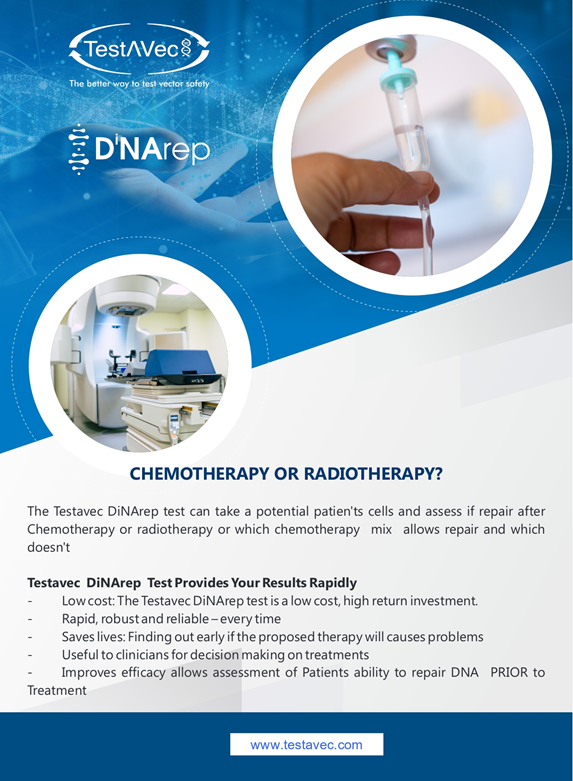A personalized test that tells how well chemotherapy, radiotherapy or gene therapy will work on individual patients is now approved for UK, US, EU and Japanese patents.

Image Credit: Testavec
It will give many people with serious diseases like cancer, heart disease, HIV and cystic fibrosis the choice to opt out of gruelling rounds of treatment that, for them, has a very slim chance of working.
Many genetic diseases like these happen when genes malfunction. Gene therapy aims to get correct copies of malfunctioning genes into patients’ targeted cells, then set them live. But the body's natural ability to repair its own DNA varies greatly from person to person.
Developed by Brunel University London and marketed by spinout company Testavec Ltd, DiNArep, which tests a patient’s ability to repair their DNA, gives a crucial clue on how they’ll react to different kinds of treatment and what will work best for that person. The ground-breaking test already patented in Japan has been awarded a second patent spanning 40 European countries.
“With the DiNArep test, it should be possible to optimise chemotherapy on an individual basis,” said Brunel’s Professor Mike Themis. “Testing a patient’s ability to repair their DNA when faced with a number of different chemotherapies enables the optimal one to be chosen. This could speed up recovery and reduce the ‘hit or miss’ approach currently used for treatment selection.”
The tests could be offered by local hospitals, says Prof Themis, adding: “they are rapid and inexpensive and could lead to much better patient outcomes.”
Chemotherapy is an aggressive treatment used to kill cancer cells – but it damages normal other cells as well. These tests could also be used for radiotherapy, letting medics optimise treatment to find the precise dose each patient can take before their normal cells can no longer repair themselves.
Gene repair capacity is also critical when giving gene therapy, which is used only to treat serious diseases such as cancers, heart disease and HIV infection. This is because gene therapy uses an engineered non-harmful version of a virus to carry the vital correct copy of the malfunctioning gene that caused the disease into the patient’s target cells by splitting open their chromosomes. So poor ability to repair DNA could lead the treatment to fail.
Another completely separate reason ability to repair DNA is important is that it can also flag up if someone is susceptible to cancer.
The ability to discover a patient's DNA repair capabilities has the potential to revolutionise the treatment strategies for genetic disorders and inherited diseases enabling more precise and effective therapeutic interventions.”
Robert Spencer, Executive Chair, Testavec Ltd